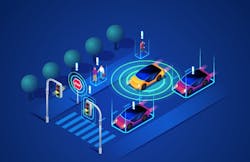We moved to California eight days before my 16th birthday. Sixteen was the earliest you could acquire a Driver’s License in California and my father helped me apply almost immediately after we arrived. That’s when he started the difficult and somewhat dangerous undertaking of my driver’s education.
My father was a pretty daunting teacher. If I had to choose just one word to help describe what he was like it would almost have to be uncompromising. And, why not? It helped him survive The Depression, the Second World War and almost sixty years in the repair community and the automotive aftermarket.
His basic focus was creating a driver who possessed world-class, defensive driving skills. That meant teaching me to be aware of the glare of brake lights off in the distance because of what they implied was about to happen. He also taught me to be aware of vehicles operating on either side of me. And, to be sure there was always room to maneuver. That you always had a way out: someplace to go in case somebody did something stupid. It was his job to make sure that I was always aware of my surroundings.
He helped me understand that if I took those lessons to heart and learned to drive accordingly, I’d more than likely manage to stay out of trouble. Fifty-seven years later, I've got a clean driving record and I've managed to stay safe and out of trouble all these years.
It’s important to note that these ideas—these elements of defensive driving—have saved me more than once, and not just on the road. If you think about it, driving defensively is a really powerful metaphor for life. And, especially, for business.
It helped when I was diagnosed with primary myelofibrosis. A disease that at the time was chronic, untreatable, and incurable. It prepared me for the stem cell/bone marrow transplant and subsequent challenges that followed. As well as for the Graft versus Host Disease that has accompanied the transplant.
Recently, it helped me deal with the blood clots in my left leg and the bi-lateral pulmonary emboli in my lungs. And, with the viral pneumonia that followed shortly thereafter.
You need that kind of situational awareness to be prepared. In order to cope. You need it to function. To get through the challenges you are being confronted with at any given moment.
When you are in business, you need to be aware of what could happen off in the distance, whether or not it actually happens. You need to be prepared in the event it does.
You need all of these defensive driving skills to protect yourself and your business. To anticipate that a shift in the economy might occur at any time. That some unforeseen disaster may occur.
You need to have the resources necessary to protect yourself from the unknown available—whether you need them or not.
I thought it was so important I actually integrated those lessons into Misfire: What to Do When Things Aren’t Running on All Cylinders, at the very beginning of the book. A mental “tickler” so the reader would be aware of it because that’s just how important I think it is.
If you look carefully, you can see the glare of head lamps off in the distance as I write this. COVID-19—the coronavirus —spread quickly. Too quickly. We still have no idea of exactly what the global impact of the disease will be on our economy. But, what we do know is that there are likely to be consequences for all of us.
The impact the drop we just witnessed in the stock market will have remains unknown. We may not be able to acquire the parts we need when and where we need them and car count may continue to remain low.
You can see the glare of brake lamps in the distance, but that isn’t necessarily cause for paranoia. It is, however, all the more reason to be prepared.
Try to keep that in mind while you work on your Plan B—And, maybe on your Plan C and Plan D—as well. Have those plans tucked away somewhere you'll be able to grab them when and if you need them. Keep them close enough to help you maneuver away from impending disaster.
Learning to drive defensively taught me to anticipate possible threats before they were imminent. Before it was too late to do anything about them. Applying those same lessons just might do the same for you.
About the Author

Mitch Schneider
Mitch Schneider is a fourth-generation auto repair professional and the former owner of Schneider’s Auto Repair in Simi Valley, Calif. He is an industry educator, seminar facilitator, blogger, and author of the acclaimed novel Misfire.
